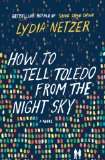Summary | Discuss | Reviews | More Information | More Books

Critics' Opinion:
Readers' rating:
Published Jul 2014
352 pages
Genre: Literary Fiction
Publication Information
Beyond the skyline of Toledo stands the Toledo Institute of Astronomy, the nation's premier center of astronomical discovery and a beacon of scientific learning for astronomers far and wide. One of these is George Dermont, a dreamer and a man of deep faith, who's trying to prove the scientific existence of a Gateway to God, and speaks to ancient gods and believes they speak back. Its newest star is Irene Sparks, a pragmatist and mathematician invited to lead the Institute's work on a massive superconductor being constructed below Toledo. This would be a scientist's dream come true, but it's particularly poignant for Irene who has been in self-imposed exile from Toledo and her estranged alcoholic mother, Bernice. When Bernice dies unexpectedly, Irene resolves to return to Toledo, and sets in motion a series of events which place George and Irene on a collision course with love, destiny and fate.
George and Irene were born to be together. Literally. Their mothers, friends since childhood, hatched a plan to get pregnant together, raise the children together and then separate them so as to become each other's soulmates as adults. Can true love exist if engineered from birth?
Lydia Netzer's How to Tell Toledo from the Night Sky is a mind-bending, heart-shattering love story for dreamers and pragmatists alike, exploring the conflicts of fate and determinism, and asking how much of life is under our control and what is pre-ordained in the stars.
You can see the full discussion here. This discussion will contain spoilers!
Some of the recent comments posted about How to Tell Toledo from the Night Sky:
Are you more comfortable believing in astronomy or astrology? Is science more trustworthy than faith?
Scientifically, what we view as fact is limited by the currently available knowledge/technology/archaeological discoveries/etc -and as those components evolve, those facts sometimes are altered. Faith can be a lack of evidence/proof, or our, as yet,... - cb
Belion
I agree with Sandra54 and Melindah--Irene and Belion were well-suited for that moment in their lives. Both were inaccessible, just marking time until the "real" one came along.
I loved it that Irene mistakingly thought Belion had planted the ... - BJ
Did you like the book? Would you recommend it?
For most of the book, I simply could not "get into it." For me, there was a lack of depth. The story line moved too slowly. I found a myriad of excuses not to return to it. In fact, were it not for my commitment to this discussion, I may not have ... - cb
Do you think Irene's behavior is morbid or a positive way to come to grips with mortality? If someone you knew did this, would you feel intervention was necessary?
I think Irene used the bridge to strengthen her resolve to not give in -as she sees her mother doing- to being knocked around by life. But I also think that flinging yourself against the darkness that tugs at you over and over and over may lead to ... - cb
Do you think it is a natural impulse for best friends to want their children to grow up to be soulmates?
Childhood best friends -of course they'd want their children to be best friends, to love each other, to marry. Just think -now best mother-in-laws, best grandmaws. But again, childhood best friends. - cb
"Although the high-concept astrophysics and philosophy may initially feel daunting, and the story frequently veers from quirky into just plain weird, things pick up speed as well-rounded characters and a few surprising twists are introduced. Whatever their beliefs on fate, readers will root for George and Irene to find their way back to each other." - Publishers Weekly
"Just the kind of touchingly offbeat stuff you could expect from the author of Shine Shine Shine, a big debut that was a New York Times Notable Book, a Los Angeles Times Book Prize Finalist, and more." - Library Journal
"It's a powerful reinvention of the love story - sometimes heart-wrenching, sometimes glorious, but always truly original. Compelling, rich with ideas, and perfectly written, it left me breathless. I love this book, and you will, too." - Joshilyn Jackson, New York Times bestselling author of A Grown Up Kind of Pretty
"In How to Tell Toledo From the Night Sky, [Netzer] writes about "twin souls who collide and love each other forever." I urge you, dear reader, to collide with this book. It may just change the way you think about love." - David Abrams, author of Fobbit
This information about How to Tell Toledo from the Night Sky was first featured
in "The BookBrowse Review" - BookBrowse's membership magazine, and in our weekly "Publishing This Week" newsletter. Publication information is for the USA, and (unless stated otherwise) represents the first print edition. The reviews are necessarily limited to those that were available to us ahead of publication. If you are the publisher or author and feel that they do not properly reflect the range of media opinion now available, send us a message with the mainstream reviews that you would like to see added.
Any "Author Information" displayed below reflects the author's biography at the time this particular book was published.
Lydia Netzer was born in Detroit. Her novel Shine Shine Shine was named of the 100 Notable Book of 2012 by the New York Times. She has written two more books, both published in 2014. She and her family live in Norfolk.





The Funeral Cryer by Wenyan Lu
Debut novelist Wenyan Lu brings us this witty yet profound story about one woman's midlife reawakening in contemporary rural China.
Your guide toexceptional books
BookBrowse seeks out and recommends the best in contemporary fiction and nonfiction—books that not only engage and entertain but also deepen our understanding of ourselves and the world around us.